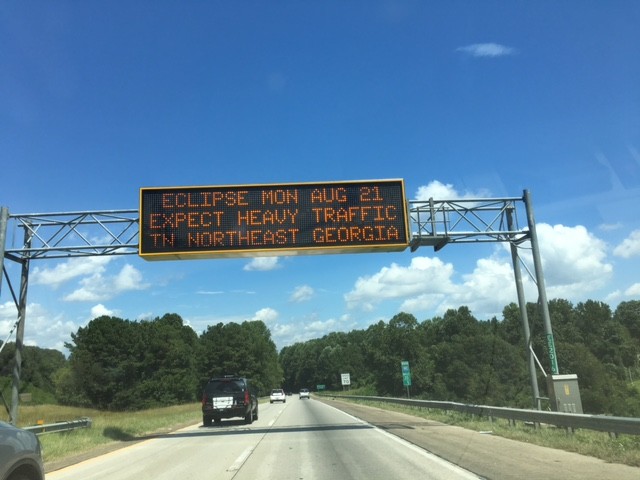Who would have thought a year ago that Monday's total eclipse of the sun would generate the kind of excitement that it has.
The frenzy has been building for several months as one community after another in and close to the band of totality - and organizations in those areas - set the stage for celebrations. Special glasses for viewing the eclipse were at a premium toward the end of last week as supplies dwindled - and some were being recalled at the last minute because they didn't meet acceptable safety standards. Hotel and motel rooms and campsites within the line of totality, including the northeast corner of Georgia, were booked to capacity - which was good news for nearby cities and towns which saw their bookings increase.
Schools have plans in place to insure that the event is a learning experience while trying to insure the safety of their students (with the focus on preventing damage to their eyes from looking directly at the sun.)
When the sun, the moon and Earth all line up, one of Georgia's best viewing spots will be in the northeast Georgia mountains.
That's what experts are saying about what's being called the Great American Eclipse. It will be the first total solar eclipse to cross the continental United States from coast to coast in nearly 100 years, The Atlanta Journal-Constitution reported. The next one will occur August 12, 2045.
Whether or not you're inside the path of totality will determine what you see in the sky. If you're outside the path, you'll likely see a partial (not total) eclipse, experts say. Even if you are not in the path but close to it, you'll still see much of the such has been blocked. For example: 99.2 percent of it in Gainesville, 98.9 percent in Athens, 98.5 percent in Buford. All of Georgia, in fact, will experience some degree of the eclipse, even Bainbridge in the far southwest corner of the state - 87 percent.
But, for most people in Habersham, Unioin, Fannin, Franklin, White, Hart and Towns counties - it will be a total blackout. The state Department of Transportation has said it is expecting up to 53,000 motorists to make their way to those areas for the eclipse.
The eclipse is expected to begin in Oregon at 10:15 a.m. local time (1:15 p.m. EDT). Its path of totality will cut a 60-mile-wide arc across the country and end in South Carolina about an hour and a half later.
The center-line path of totality - where the moon completely blocks the sun, the earth goes dark and the sun's corona shimmers in the blackened sky - will stretch from Salem, Oregon, to Charleston, South Carolina, and will last up to 2 minutes and 41.6 seconds, the newspaper reported.
The last total solar eclipse in Georgia was on March 7, 1970, and included most of the coastal part of the state.
Savannah was a popular gathering spot for that event. Motels and hotels were booked solid, meaning hotels and motels in surrounding areas, such as Richmond Hill, benefited from the crowds that flocked to the area. There was one problem: it was overcast when it came time for the eclipse - early afternoon. Nevertheless, you could tell something was amiss. Street lights and other lights that automatically come on at dusk came on. It got noticeably cooler. Cars and trucks used their headlights.
Click here for a map that shows the line of totality for that blackout as well as a look all every other total solar eclipse to touch the U.S. since 1776.
On May 30, 1984, there was an annular eclipse that could be seen in parts of north Georgia, including Gainesville. An annular eclipse occurs when the moon moves between the earth and the sun but only blocks the center of the sun, leaving a "ring of fire" around its edges.
NASA will be streaming the eclipse live beginning with a preview show at 12:00 p.m. EDT.
https://www.nasa.gov/eclipselive-info
An Oregon man has been sharing a warning about the eclipse after being partially blinded during a total eclipse in 1963.
NASA, meanwhile, is trying debunk some myths about the eclipse.
https://eclipse2017.nasa.gov/eclipse-misconceptions
But, the agency is non-committal on how much of an impact a solar eclipse causes on birds and animals. A posting on its Website says "It has been reported during many eclipses that many different animals are startled by totality and change their behavior thinking that twilight has arrived. You can explore this yourself with your own pets, or by watching local wildlife, especially birds."
There are many other Websites that cite instances of unusual animal and bird behavior during eclipses.
Chasing eclipses across the globe is a way of life for some people.
http://accesswdun.com/article/2017/8/571682
Some estimates say the eclipse will cost U.S. businesses $64 million in lost work.
https://www.circa.com/story/2017/08/18/whoa/solar-eclipse-will-cost-us-companies-694m-in-lost-work
Where will you be when the eclipse occurs?
The AccessWDUN Survey Question Friday asked: Are you taking the day off, leaving work early or otherwise making special plans for the eclipse on Monday? Respondents were given three choices: 73.7% chose "Nope. I may step outside, but that's about it." 19.7% chose "Yes, I've been planning for this." 6.5% chose "I'll decide Monday."
(The Associated Press contributed to this report.)
(EDITOR'S NOTE: The description of what Savannah was like during the 1970 eclipse is a first-hand account of the event from AccessWDUN's Ken Stanford.)










